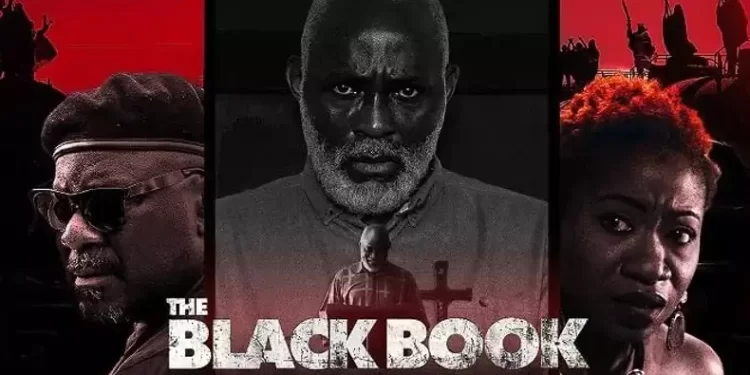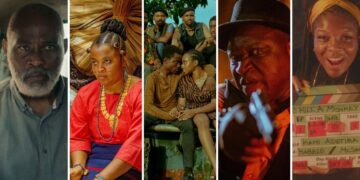Nigeria’s most expensive film to date, with a budget of a cool one million dollars, The Black Book is an enterprise in search of nothing short of glory. Does it achieve it? Directed by Editi Effiong, it follows Richard Mofe-Damijo (RMD) as retired special ops officer Paul Edima, the aged warrior living a normal life with his son before he is thrust back into a world of deceit and underhanded dealings after said son is killed and framed (in that order) for a kidnapping he did not commit. It’s John Wick set in Nigeria, but instead of a dog, that white man’s best friend—it’s his son, a black man’s walking validation.
RMD is a fine actor, convincing in the role of Edima, the devil everyone is terrified of. His performance is believable in part due to the film’s shortcoming of there being a lopsided balance between action and crime thriller. The talking goes on for too long, the world is built to the point I fear a sequel. But Edima is so affecting in the talking that it doesn’t seem to matter until you notice the scenes look wonderful, but you, as the viewer, feel nothing. The Black Book would’ve had much better chances as a straight action flick, like its inspiration. The action sequences are all right, in and of themselves, but they don’t tingle the senses at all or make me believe that anyone I care about is in grave danger. The film gives us an assortment of stand-offs, assassins on rooftops, and crippled men, formerly an army general, surrounded by big scary men. There are a few choreographed fight sequences here and there, but nothing to sell the film’s entire point—this dangerous man, Paul Edima, the one they talk so much about. They tell, but they never show us what he’s capable of.
Of course, this can be explained by the fact that after quitting his special ops life, he gave his life to God and became a pastor. Before his son is killed, we learn that Edima asks him every week to go to church with him, but his son always refuses. The day he intends to go is the day he is captured and murdered. This fact would’ve made him say ‘to hell’ with the bible and start shooting everybody in a better movie, but here, he doesn’t want to hurt anyone, which makes the film all the more dull for it. It’s hard not to compare this with John Wick, which basically reads the same on synopsis reveal. The first two John Wicks spared us the humdrum clichés of that world and instead focused on nothing but action. They left the lore-nonsense for the latter two, by which time the franchise already had our pre-ordered tickets. The first John Wick is mostly just gunshots and death at ninety minutes from front to back—killings delivered in the most cinematic way imaginable. Choreography and cinematography married together can mesmerise anyone. Most of the actors’ work went into training, and I don’t even think a script was sacred at all on that set.
The Black Book overlooks an old wise storytelling maxim: an audience doesn’t give a hoot about somebody’s past, but maybe, just maybe, you can get them to care about their future. This is a movie largely about a man’s past. In John Wick, the killings are interesting not only because they are choreographed by some of the best performative martial artists in the world, behind neon lights no less, and not only because Keanu Reeves does it in more and more creative ways (killing with… a book!), but because it gets us closer and closer to a conclusion. Will John get his revenge? And find the dog-killing criminal? While we’re wrestling with that, we’re fully immersed in the present. In The Black Book, there are the same questions of whether he will get his revenge and whether or not he will clear his son’s name, but the whole time it’s happening, we’re so bogged down by the past that it’s quite frankly exhausting. When they’re not talking about the past, they’re standing around trying to make a street thug, a woman named Big Daddy (played by Shaffy Bello), convincing. A common problem of mixed tone: we have comic-strip movie characters (which I generally enjoy, nothing wrong with that) set in the real world. Kidnapping is a serious problem in present-day Nigeria, and one would be spot-on within the first fifteen minutes in thinking The Black Book could do for Nigeria what Tony Scott’s Man on Fire (2004) did for Mexico’s kidnapping problem. But The Black Book doesn’t care, treating it merely as a convenient, socially relevant plot point. It’s a crime thriller with no thrill, sorely missing good action.
There’s a journalist who’s caught up in the proceedings, played thoroughly by Ade Laoye. I say thoroughly because she has quite the presence in a story that doesn’t seem to need her. But yet, she’s there, and boy, is she there! Snooping, sweating, cursing, running around to uncover stories that have nothing to do with her. You know, being your friendly neighbourhood journalist—until it does have something to do with her. So, her mother was a journalist too; as it happens, she was one of the victims of a younger, more ruthless Edima. Journalists are always the cliché most belonging to the ego of writers in need of inserting themselves into the story. We have so many journalist characters on screen today, and this is my theory as to why. It’s easier to write a journalist because so many screenwriters, novelists, or any kind of writer start off this way, but they seem to have forgotten how boring the life of an on-the-field journalist actually is, and it’s hardly worth writing about. I should know.
The title of this flick comes from a book that Edima once had that documents all of the covert missions his former General—the eventual antagonist—has orchestrated over the years. Knowledge of this book is only shared near the movie’s end, as if they desperately needed to justify their lacklustre title. It doesn’t raise the proverbial eyebrow at all. A pristine production of an undercooked idea—but not story, story is what it has too much of.
In only five days since its release, The Black Book has become Netflix’s biggest title yet out of Nigeria, taking the number one spot on Netflix’s Global Top 10 Films, the first Nollywood title to do so, and is currently charting at number one in 20 countries. I cannot, for the life of me, account for its success. Perhaps Netflix subscribers, going by the sterling numbers of titles like Extraction (which this saga brings to mind), just like it when things go boom, which The Black Book has a fair share of. But maybe it’s the trend-following atmosphere of the movie. Or it could be that a big chunk of that cool million went towards effective promotion. I don’t know. But that million-dollar budget does decorate the movie tremendously. The first scene, the kidnapping, happens on a super highway loaded with extras. And from that scene alone, you can tell the financial backers weren’t kidding about this at all. Despite its flaws, what this film has achieved globally in only a few days cannot be stated enough. It’s a triumph not only for Nigeria but for a continent still trying to find its place in the mega-global storytelling landscape long conquered by Hollywood, South Korea and Bollywood.
The Black Book is now streaming on Netflix.
Enjoyed this article?
To receive the latest updates from Sinema Focus directly to your inbox, subscribe now.











